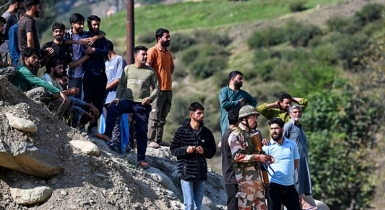
A new working paper published by the National Bureau of Economic Research, argues that the macroeconomic damage from climate change might be as much as six times higher than previously estimated. Serious macroeconomic decision-makers, accustomed to evidence-based policy, are beginning to ask exactly what global warming’s costs and benefits are for their particular countries.
Some academics at Harvard and North-western, opened varied discussions cantering the real costs of climate change, to human welfare and to national economies, all these vital questions have been going on for decades after decades.
With the change of global weather conditions, as opined by weather academics, we no longer need such estimates to make an appropriate policy in order to make a real estimate of the critical problem mounting with the passage of time. That is why, the policymaking bodies need to have the real imputes for measuring the global weather condition just similar to employment or price data, they envisioned.
Many studies in this regard opined saying that, the successes in the fight against climate change requires more pragmatic measurement of relevant data to chalk out fruitful policy making in the best interest of human beings across the planet Earth.
In the real sense of the term, the policymakers across the globe are still short of objective, sector-specific and precise estimates of current and possible future costs in relevant areas. That shortage has become a growing problem — because climate policy is beginning to bite everywhere. Billions of taxpayer dollars are being directed to sectors that promise to curb emissions; consumers are paying more for carbon-intensive goods and services; and pressure to follow a net zero strategy has complicated decisions for companies and institutional investors, they believed.Because, when money moves, however, people begin to ask pointed questions in this regard. It isn’t just various politicians attacking “woke capital” to get in the headlines..
In view of that, it’s very much justified to add the costs of global warming as inputs into policymaking research in the matter - similar to employment or price statistics. It isn’t hard to understand that global warming is already changing how we live. In India’s capital, New Delhi, this summer has been so hot — above 40 degrees Celsius (104 Fahrenheit) even at night — that people are gasping, the tap water is scalding, and the walls of their homes emit heat like radiators.
The Saudi Arabian authorities said that 1,300 pilgrims have already died on this year’s Hajj. Players at the European soccer championships are collapsing due to exhaustion.And yet economists — clearly able to keep cool heads when everybody else is losing their stand - in the middle of a fresh debate about the real costs of climate change.
The models made by the economists predict that a single degree increase “in global mean temperatures leads to a gradual decline in world GDP that peaks at 12 percent after six years and does not fully mean-revert even 10 years after the shock.”
They pointed out that this makes unilateral climate action worth it for countries like the United States; that argument must surely also hold countries that are poorer but far more exposed to climate change, such as India. Is it also not possible to add a couple more countries here in the measurement, they raised questions.
Meanwhile, the said paper published by Harvard and North-western, has set off a storm of furious criticism, and not just from economists. The climate scientist John Kennedy argues that its methodology may be flawed. He isn’t sure, for example, none can easily extrapolate from the historical record of 0.3-degree shocks to global temperature to the larger, one-degree changes associated with climate change.
In view of that, it’s clear that global warming is already having a malign effect on human health and livelihoods and as such we just need more clarity on how much it might rise in coming years.
India’s chief economic adviser, for example, asked earlier this year if we were irrationally scared of the health effects of global warming. It is true that we in India are more exposed to heat stress than most. But, he pointed out, large-scale studies suggest that far more people die in India as a consequence of “moderate cold” than from extreme heat.
Delhi’s temperature might stay above 40 degrees for weeks on end, with all the negative effects on public health and economic activity that entails; but would other Indians actually live longer if average temperatures rose? He raised a question saying that we do not have real evidence for the aggregate effect of higher temperatures on mortality in India and the rest of the developing world?
That is why, some of the vital points need to be taken into account in any such studies:(A)Worsening floods, deterioration pose threats to US dam safety(B)Google’s emissions shot up 48 percent over five years due to AI(C) Bay Area heat wave, Northern California wildfires and power shutoffs continue as temperatures soar(D)California’s Death Valley may tie daily record of 129F on Sunday (E)The Bay Area heat wave explained in 10 charts and maps
Climate analysts also pointed out that all those vital points are real questions that deserve real answers to reach a conclusion. Because the data currently have is not sufficient and as such the lack of data might lead to erroneous conclusions.
Some scholars in India have noted that those most exposed to heat stress are manual labourers, construction workers and farmers including the marginalized groups whose illnesses and deaths the country’s public health system might not properly record.
In the context of the above vital points the researchers are of the view that more resources needed to be put in areas for identifying and analysing the effects of warmer temperatures. In this regard, some efforts have already begun. Last year, the World Health Organization (WHO) released a framework to quantify the economic value of the health outcomes of climate-related investments.
According to analysts, countries like India, Saudi Arabia and all relevant countries must also begin to quantify the many indirect effects of climate change on their macroeconomic fundamentals: from greater variability in farm output to less productive physical investments.Global climate experts also opined that climate policy makers can hardly make evidence-based policy for the greatest global problem of our time without more high-quality data.
In consideration to all relevant points documented above in the matter like global climate change, Bangladesh being one of the most climate vulnerable countries in the South Asian region shall have to chalk out a pragmatic climate policy in the best interest of the people in all strata of the society and country as a whole. The relevant functionaries of the government in collaboration of the different stakeholders specially in private sectors have to continue relentless efforts with greater mission and vision to contribute in this mounting task to march ahead joining with countries across the globe in the best interest of the Mother Earth.
The writer is a Senior Journalist and Media Analyst, writes mainly on Promoting Knowledge Based Society, Socio-Economic Transformation, Climate Change, Rule of Law, Human Rights & Good Governance.





































